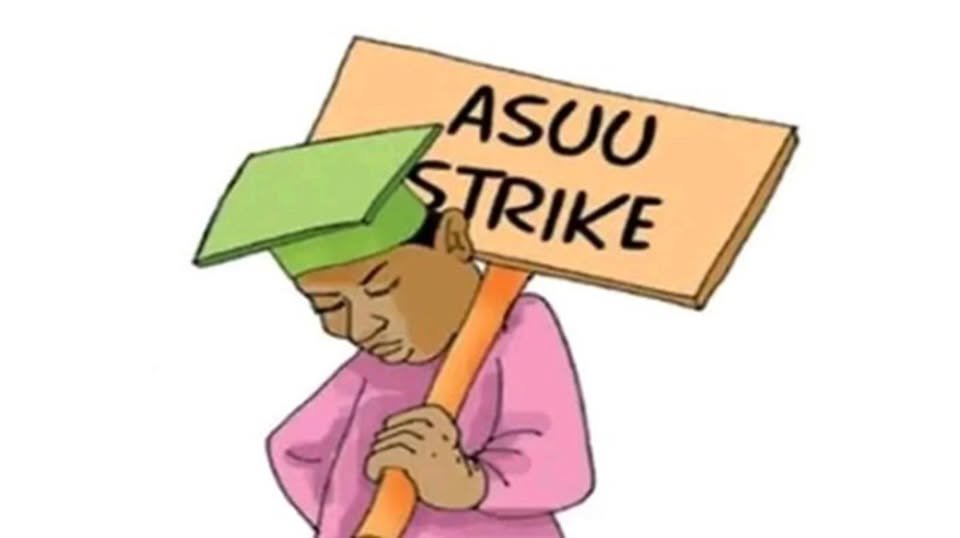
Chaos on Campus: ASUU Declares Nationwide Strike as Salary Crisis Pushes Lecturers to the Edge

Nigerian universities have once again been thrown into disarray as the Academic Staff Union of Universities (ASUU) has officially declared a nationwide strike, effectively grinding academic activities to a halt. This shocking development was confirmed on Monday, July 8, in Abuja by ASUU President, Professor Chris Piwuna, who cited the federal government’s continued failure to promptly pay lecturers’ salaries as the breaking point. The move, according to him, is not a threat or a negotiation tactic—it is the enforcement of a standing policy: “No Pay, No Work.”
This latest action follows a resolution by the union’s National Executive Council (NEC), which mandates lecturers to withdraw their services if salaries are not paid within three days after the due date. As of now, universities such as the University of Jos and the University of Abuja have already joined the strike, with more institutions expected to follow suit in the coming days.
Prof. Piwuna expressed deep frustration over what he described as the chronic mishandling of lecturers’ welfare, stating that many of them are living in financial distress due to consistent salary delays. He said the decision to down tools was inevitable, given that their meagre earnings are now not only insufficient but also irregularly paid.
The core of the dispute lies in the transition from the Integrated Personnel and Payroll Information System (IPPIS) to the Government Integrated Financial Management Information System (GIFMIS). Since this switch, ASUU claims that the situation has only deteriorated. According to Prof. Piwuna, this shift has become a nightmare for lecturers, who now face salary delays ranging from a week to ten days beyond the standard date—without any explanations or accountability.
“We are not starting a new fight,” Piwuna said sternly. “We are simply enforcing what we have already resolved: if there is no pay, there will be no work. Our members are being pushed to the wall. They cannot continue to teach, supervise students, and conduct research on empty stomachs while their own government treats their livelihoods with indifference.”
The ASUU leader revealed that the union has made repeated appeals to key government officials, including the Minister of Education and the Accountant General of the Federation. However, these efforts have reportedly fallen on deaf ears. Meetings have been held, letters have been sent, and concerns have been raised, yet nothing substantial has changed.
Prof. Piwuna placed the blame squarely on the Office of the Accountant General, accusing officials there of deliberately frustrating the payment process. He insisted that the payment platform itself is not the problem. In his words, “The platform is working fine; it is those who are supposed to activate the process that are deliberately holding things back. It is sabotage, plain and simple.”
As the strike spreads across Nigerian universities, thousands of students are left stranded once again in what has become an all-too-familiar crisis in the country’s higher education system. Final year students working on their projects, undergraduates preparing for exams, and freshers trying to find their footing all now face an uncertain academic future.
Beyond salary delays, ASUU also raised alarms over the lingering issue of Earned Academic Allowance (EAA). The union claims that out of the N50 billion owed to its members, the federal government has only paid N40 billion, with N10 billion still outstanding. The ASUU President warned that failure to release the remaining funds could spark another confrontation.
“We’re tired of begging. The outstanding N10 billion must be paid. We won’t keep repeating the same demands every year while our members suffer. We are not asking for luxury—we are asking for what is owed,” Piwuna stressed.
The current ASUU strike comes amid growing public concern about the state of tertiary education in Nigeria. For years, the nation’s universities have faced persistent challenges—ranging from underfunding and poor infrastructure to strikes and brain drain. The recurring breakdown in the academic calendar has discouraged many students and frustrated parents who make enormous sacrifices to send their children to school.
This latest strike may be one of the most significant yet, as it is not centered around long negotiations or policy debates but rather a basic, non-negotiable demand: the right of workers to be paid on time. That lecturers are forced to withdraw their services simply to receive what is rightfully theirs has sparked outrage and embarrassment in equal measure.
With no concrete response yet from the federal government, the standoff between ASUU and the authorities appears far from over. Many are now calling on President Bola Tinubu to personally intervene and address what they see as an escalating crisis. Education stakeholders, student unions, and civil society organizations are also beginning to speak up, warning that continued neglect of academic staff welfare could destroy what is left of the public university system.
In campuses across the country, the mood is tense. Lecture halls are empty, administrative offices are quiet, and the usual buzz of academic life has faded into an uneasy silence. Some students have already begun returning home, unsure of when or if the strike will be called off. Others remain in hostels, clinging to hope that reason will prevail before the damage becomes irreversible.
For many Nigerians, this strike feels like déjà vu—yet another chapter in the long history of conflict between ASUU and the federal government. But this time, the issue is painfully simple: pay the people who teach the nation’s future. Until that happens, ASUU has made it clear that Nigerian universities will remain locked in a standstill, with no lectures, no exams, and no progress.
As days stretch into weeks and frustration mounts, the question on everyone’s lips is: will the government finally act, or will Nigeria’s higher education system be left to crumble once again under the weight of neglect and broken promises?


